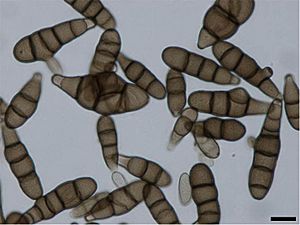Alternaria brassicicola facts for kids
Quick facts for kids Alternaria brassicicola |
|
|---|---|
 |
|
| Scientific classification | |
| Genus: |
Alternaria
|
| Species: |
brassicicola
|
| Synonyms | |
|
Alternaria brassicae f. microspora |
|
Alternaria brassicicola is a tiny fungus that can cause diseases in plants. It belongs to a group of fungi called Pleosporaceae. This fungus has thin, branching threads called hyphae. These threads are very small, about 1.5 to 7.5 micrometres wide. (A micrometer is a millionth of a meter, super tiny!)
When these hyphae first grow, they are clear. But as they get older, their color changes to brown or olive-brown. The fungus also makes tiny reproductive cells called conidium. These conidia are about 5 to 8 micrometers wide and can be up to 70 micrometers long. They help the fungus spread to new plants.
Contents
What is Alternaria brassicicola?
Alternaria brassicicola is a type of fungus that acts as a plant pathogen. This means it can cause diseases in plants. It is known to affect many plants in the cabbage family, like broccoli, cauliflower, and kale.
How it Affects Plants
This fungus causes a disease often called "Alternaria spot" or "black spot." It creates dark spots on the leaves, stems, and seed pods of affected plants. These spots can grow larger and sometimes merge together.
If the disease is severe, it can cause leaves to turn yellow and fall off. It can also reduce the quality and yield of crops. This is why it's important for farmers to manage this fungus.
How it Spreads
The tiny conidia (spores) of Alternaria brassicicola are easily carried by wind and rain. They can also spread through infected seeds. When these spores land on a healthy plant, they can start a new infection.
The fungus prefers warm and humid conditions to grow and spread. This is why it's often a bigger problem in certain climates or during specific times of the year.
Images for kids
See also
 In Spanish: Alternaria brassicicola para niños
In Spanish: Alternaria brassicicola para niños


